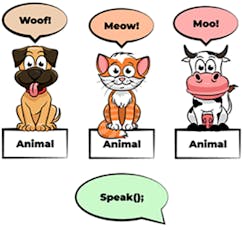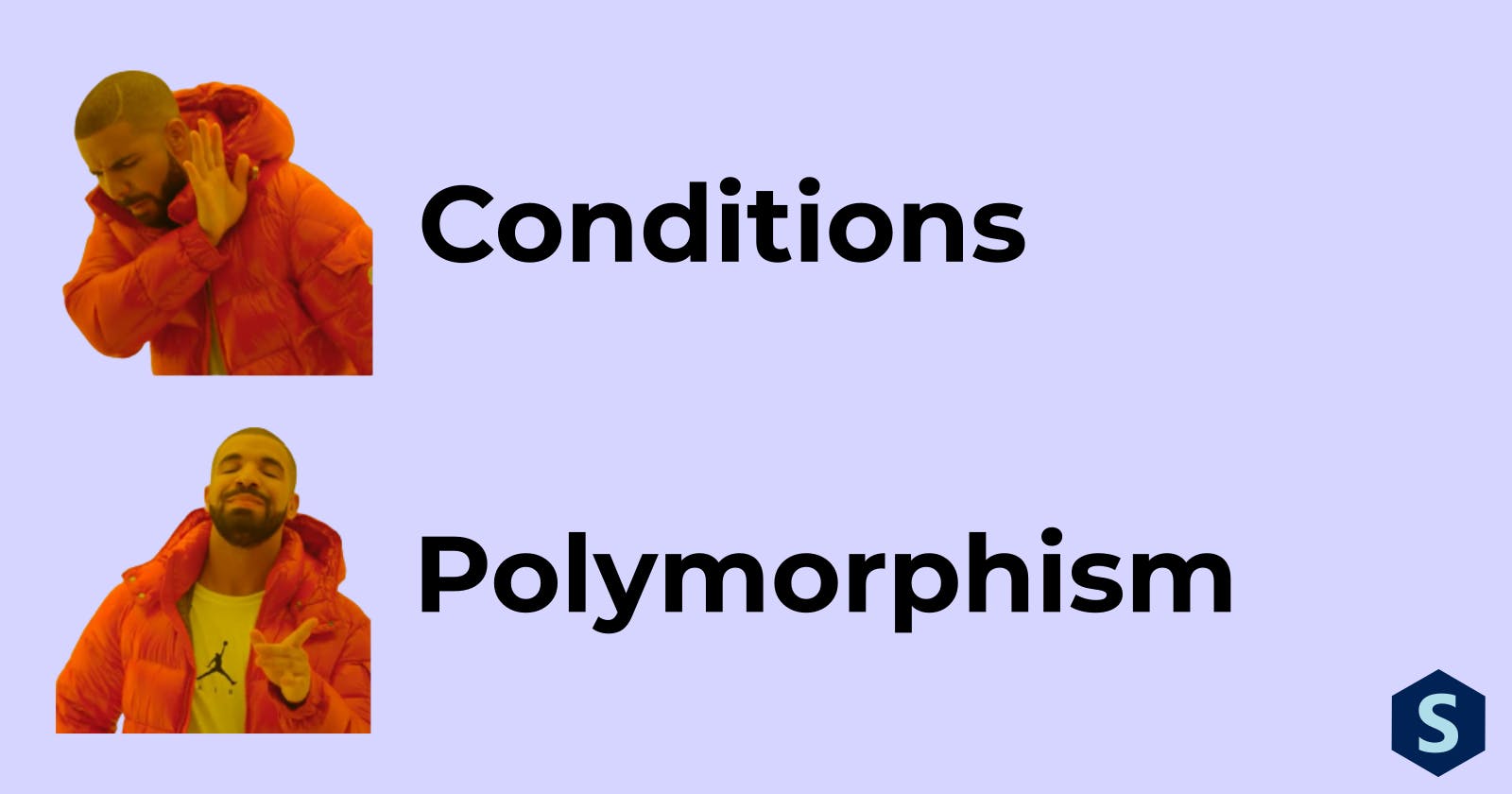Conditions? More like Polymorphism
Stop repeating same conditions everywhere, use polymorphism!
Ever repeated a condition everywhere?
Maybe because you wanted to represent one value in two different formats?
Maybe because you wanted to add a special value to it?
Nah, stop doing that, use Polymorphism instead.
Polymorphism

A big concept in Object Oriented Programming. Basically, it's the scenario when you have two classes that implement the same interface / extend the same class.
// Trivial example
interface Animal {
function food(): string;
function sound(): string;
}
class Dog implements Animal {
function food() return "bone";
function sound() return "bark";
}
class Cat implements Animal {
function food() return "fish";
function sound() return "meow";
}
// We declare using the interface
const aCat: Animal = new Cat();
const aDog: Animal = new Dog();
// Same type, but different implementation
aDog.sound(); // bark
aCat.sound(); // meow
In my own words,
Polymorphism is the different implementations in objects of the same type / class / interface.
Back to the example, we can see that both aCat and aDog are Animal interface, but their implementations for sound is different because, under the hood, they are different classes.
And that's polymorphism, usually seems pointless in trivial examples like this, let's move on with real-world applications.
Case Study: Food Delivery System

PS: This is a real-world example from one of my past jobs.
Say, you are asked to build a food delivery system. Particularly, the UI for displaying the order time.
Requirements: There are two modes for order time, ASAP, and datetime. Currently, the database has allocated a string column for it, so it should be stored as string.
Naive Implementation
Let's go with a naive implementation
interface DisplayDatetimeProps {
datetime: string;
}
const DisplayOrderTime = ({datetime}: DisplayDatetimeProps) => {
const dateString = datetime == "asap" ?
"ASAP" :
// the format is Wed, 16th Mar
moment(datetime).format("ddd, Do MMM");
return <Text>{dateString}</Text>
}
Looks good? No, not when you have this statement spread everywhere
const OrderSummary = () => {
...
const dateString = datetime == "asap" ?
"ASAP" :
// the format is Wed, 16th Mar
moment(datetime).format("ddd, Do MMM");
...
}
const OrderDatetime = () => {
...
const dateString = datetime == "asap" ?
"ASAP" :
// the format is Wed, 16th Mar
moment(datetime).format("ddd, Do MMM");
...
}
const = () => {
...
const dateString = datetime == "asap" ?
"ASAP" :
// the format is Wed, 16th Mar
moment(datetime).format("ddd, Do MMM");
...
}
What happened?
You copied pasted your codes.
The new intern copied pasted your codes.
The other juniors copied pasted your codes.
And now, the codes went viral, it's everywhere in the code base.
Oh no, so what now?
Extract Function
Obviously, if it's repeated, we make it a function, and that's what we call Extract Function!
// utils.ts
// Not the common part is extracted to a separate function
export const formatDateString = (datetime: string) => {
return dateString = datetime == "asap" ?
"ASAP" :
// the format is Wed, 16th Mar
moment(datetime).format("ddd, Do MMM");
}
// DisplayOrderTime.ts
import {formatDateString} from "utils.ts";
interface DisplayDatetimeProps {
datetime: string;
}
const DisplayOrderTime = ({datetime}: DisplayDatetimeProps) => {
return <Text>{formatDateString(datetime)}</Text>
}
Looks much better, right? We don't have the logic spread everywhere.
Let's see what happens when our codes grow. Let's say we now need a few more functions that deal with datetime here.
export const formatDateString = (datetime: string) => {
return dateString = datetime == "asap" ? "ASAP" :
// the format is Wed, 16th Mar
moment(datetime).format("ddd, Do MMM");
}
export const minutesFromNow(datetime: string) => {
return dateString = datetime == "asap" ? 0 :
moment(datetime).diff(moment(), "minutes");
}
export const isWeekend(datetime: string) => {
const dateInMoment = datetime == "asap" ? moment() : moment(datetime);
const day = dateInMoment.format("ddd");
return day == "Sat" || day == "Sun";
}
// and 5 more as such
Eww, gross. The logic got spread everywhere again.
While this time they're at least contained in a single file, those are still duplicated logics. What if instead of adding the function here, someone added a isBefore6pm in one of the components?
How bad can this be? Look, one day, someone might have decided to switch to using "now" instead of "asap", and it's gonna be painful changing all these.
Of course, there's another alternative
export const isAsap(datetime: string) {
return datetime == "asap";
}
export const formatDateString = (datetime: string) => {
return dateString = isAsap(datetime) ? "ASAP" :
// the format is Wed, 16th Mar
moment(datetime).format("ddd, Do MMM");
}
While this does reduce the duplication somewhat, personally, I dislike how the conditions get thrown all around, duplicating the logical checking everywhere.

Fret not, polymorphism is here to save us!
Polymorphism
Let's build the classes. We'll need two concrete classes for asap type, and for normal datetime type, and a parent interface for both.
interface OrderDatetime {
formatDate(format?: string): string;
minutesFromNow(): number;
isWeekend(): boolean;
toString(): string; // let's add this for serialization purpose
}
export class AsapOrderDatetime {
formatDate() {
return "ASAP";
}
minutesFromNow() {
return 0;
};
isWeekend() {
const day = moment().format("ddd");
return day == "Sat" || day == "Sun";
};
toString() {
return "asap";
}
}
export class NormalOrderDatetime {
datetime: Moment;
constructor(datetime: string) {
this.datetime = moment(datetime);
}
formatDate(format = "ddd, Do MMM") {
return datetime.format(format);
}
minutesFromNow() {
return datetime.diff(moment(), "minutes");
};
isWeekend() {
const day = datetime.format("ddd");
return day == "Sat" || day == "Sun";
};
toString() {
return datetime.toISOString();
}
}
And to actually start using these, we will need to depend on a Factory to help instantiate these objects to hide the implementations from the users.
export default orderDatetimeFactory(datetime: string): OrderDatetime {
return datetime == "asap" ? new AsapOrderDatetime () :
new NormalOrderDatetime(datetime);
}
And here's the only place where the boolean check appears.
Let's see how the component looks like now
interface DisplayDatetimeProps {
datetime: OrderDatetime;
}
const DisplayOrderTime = ({datetime}: DisplayDatetimeProps) => {
return <Text>{datetime.format()}</Text>
}
Short and concise, exactly how we like it to be!
And this, is how we use polymorphism.
Bonus: Persistent State Management?

Some of you might be wondering, how can we use this polymorphism if we need to persist the data into, like browser's localstorage?
Well, look back up, I've included a toString() method for exactly that purpose. I'll show how can it be used in my favorite state management library: zustand
interface OrderStore {
_datetime: string;
readonly datetime: OrderDatetime;
setOrderDatetime: (datetime: string) => void:
}
export const useOrderStore = create(OrderStore)(
persist(
(set, get): OrderStore => ({
_datetime: "asap",
// IMPORTANT
get datetime: () => {
return orderDatetimeFactory(get()._datetime);
},
setOrderDatetime: (datetime: string): void => {
set(() => ({
_datetime: datetime,
}));
},
}),
{
name: "Order",
getStorage: () => localStorage, // Persistent storage
}
)
);
What I did was hide the internal datetime string, and always return a OrderDatetime object. And that's it! Zustand will store the string representation in browser, but what you get is always the object.
Last Words
I came across this amazing technique when I was reading Martin Fowler's Refactoring. More specifically, this technique is called Replace Conditional with Polymorphism.
Now that you know about this technique, let's make the programming world better together 🤩
